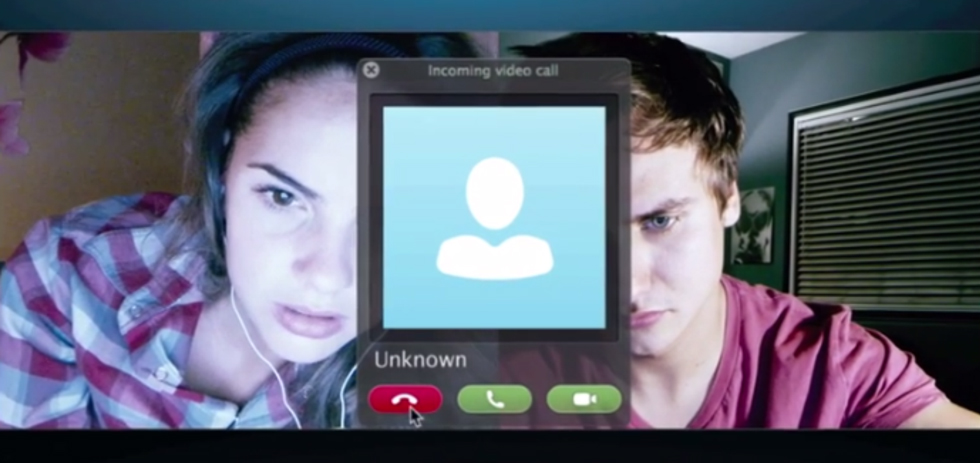The latest in Blumhouse’s line of low-budget/high-return Horror flicks,1 Unfriended is a modern morality tale that, like the recent Open Windows, takes place entirely on the desktop of our protagonist’s computer. The film is the brainchild of Timur Bekmambetov, best known for his work on Wanted and the Night Watch/Day Watch franchise (although I most fondly remember him as the director of the wrongfully maligned Abraham Lincoln: Vampire Hunter), and is a fantastic little genre flick that delivers a whole lot of creative, cheeky fun with a few inventive scares mixed in for good measure.
The film (which runs in real-time) follows a Skype conversation between a group of teenagers and an uninvited ‘cybernatural’ guest on the anniversary of their friend’s suicide after relentless cyberbullying.2 It’s a nice little conceit that is effectively executed with surprising potency, given the many failed attempts within the genre to construct a proficient Horror outing that deals with paranormal entities and their use of internet technologies. A lot of this is down to the believability of the performances and the script – the use of no name performers (the biggest credit any of the actors have is Jacob Wysocki, who played the titular Terri in Terri with John C. Reilly), and the decision to shoot the whole thing in a set of single take sessions with (mainly) improvised dialogue works wonders. Something that would traditionally fall flat instead soars with a cast that feel like real human beings, who react to stimuli in real-time with actual emotional engagement.
It’s great to see a film finally deal with modern technology practices (use of Skype, Instagram, Facebook, Spotify etc.) and cyberbullying in a way that isn’t cringeworthy and pretty much hits the nail squarely on the head. This isn’t another incarnation of Smiley, with its terrible engagement with meme and *chan culture, nor is it another laughable internet ghost movie like Fear-Dot-Com (or should I say feardotcom.com?) – Unfriended is its own unique beast and its commentary on cyberbullying (and the bandwagon effect) seems both fierce and spot on. Furthermore, there isn’t one point in the film where you ask yourself “why don’t they just log off?” – not only do the rules of the situation that our cast find themselves in forbid such an action, but it seems that such a thought would not occur to them as they, like much younger people today (myself included), are addicted to the use of these technology platforms.3 All actions they take revolve around ending Skype calls, blocking contacts, or terminating accounts rather than disengaging from these mediums altogether, an effect that can only come from finding one’s life irrevocably intertwined with social media platforms.
Beyond this, it’s great to see a technology-based Horror flick that sacrifices product placement and brand-based payouts in favour of realism. The technologies used in the film are all real and have been selected due to their popularity rather than to push a product. It’s highly unlikely that Spotify or Gmail have paid for their particular technology to be used in the film, and it’s to the film’s strength that immersion isn’t broken by the characters using something like Tidal or Yahoo! Mail instead (something that surely would have reaped greater back-end financial rewards).
That’s not to say that the film isn’t without its flaws – as the film is set on a simulated desktop rather than an actual one the film lends itself to a couple of continuity goofs.4 There are songs played on Spotify in the background that run longer than their true duration, a character casts her screen over Skype without disengaging the apparent stream before the film is over, and at one point an entity communicates using another person’s instant messaging account, an act that breaks the film’s own rules and is never referenced again. These minor discrepancies don’t detract from the overall experience however. The film is about as good as it could ever be, considering its narrative and conceit-driven constraints.
Unfriended will surely age poorly and become outdated as the ways in which we engage with modern technology change (this could have easily been made in the post-Ring era with MySpace), but presently the film stands out as one of the most inventive and fun Horror films to find distribution from a major body and is a heck of a good time. Leave your better judgement and studio cynicism at the door, and check it out while it still holds resonance – it does not disappoint.

